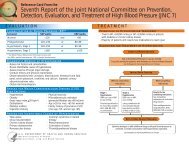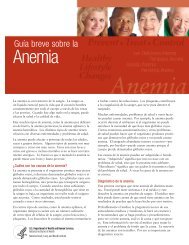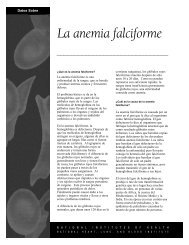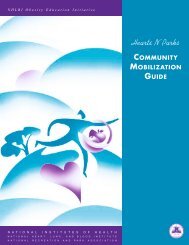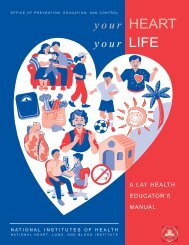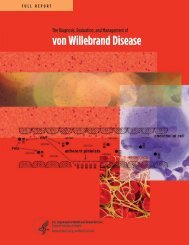- Page 1:
National Heart, Lung, and Blood Ins
- Page 4 and 5:
CHAIRS AND EDITORS Chair and Editor
- Page 6 and 7:
Anne McTiernan, M.D., Ph.D. Associa
- Page 8 and 9:
Lenore Manderson, Ph.D. Director an
- Page 10 and 11:
Michael Mendelsohn, M.D. Director,
- Page 13 and 14:
TABLE OF CONTENTS Preface XIII 1 Ex
- Page 15 and 16:
PREFACE Women’s health and menopa
- Page 17 and 18:
CHAPTER 1: EXECUTIVE SUMMARY Nanett
- Page 19 and 20:
TABLE 1-1 Evidence Categories Evide
- Page 21 and 22:
TABLE 1-2 (continued) Possible Bene
- Page 23 and 24:
symptom measures, cultural factors,
- Page 25 and 26:
5. PHYSIOLOGICAL ROLE OF ESTROGEN A
- Page 27 and 28:
The atherogenic risk profile of old
- Page 29 and 30:
• Hormone replacement therapy: Fi
- Page 31 and 32:
tion of the remaining ridge in area
- Page 33 and 34:
9.3.1 Interventions • In many cas
- Page 35 and 36:
Parkinson’s disease, no overall p
- Page 37 and 38:
TABLE 1-3 (continued) Sexuality •
- Page 39 and 40:
CHAPTER 2: THE MENOPAUSE AND AGING
- Page 41 and 42:
oped and are less prepared to addre
- Page 43 and 44:
FIGURE 2-4 Diabetes Mellitus. Estim
- Page 45 and 46:
Sarcopenia, defined as reduced musc
- Page 47 and 48:
Perimenopause WHO The term “perim
- Page 49 and 50:
decrease about 2 years before the F
- Page 51 and 52:
4.3 Menstrually Defined Menopausal
- Page 53 and 54:
to be under stress and to hold part
- Page 55 and 56:
21 Brincat MP. Hormone replacement
- Page 57 and 58:
62 Orentreich N, Brind JL, Rizer RL
- Page 59 and 60:
CHAPTER 3: SYMPTOMS AND THE MENOPAU
- Page 61 and 62:
women who may have reached natural
- Page 63 and 64:
numb-tingling feelings, headaches,
- Page 65 and 66:
(47 percent), problems sleeping (39
- Page 67 and 68:
FIGURE 3-2 Proportion of Women Both
- Page 69 and 70:
tomized hypogonadotropic women expe
- Page 71 and 72:
5.1 Exercise It has been suggested
- Page 73 and 74:
to consume 20-150 mg/day of isoflav
- Page 75 and 76:
REFERENCES 1 Stewart AL, Hays RD, W
- Page 77 and 78:
48 Avis NE, Crawford SL, McKinlay S
- Page 79:
92 Albertazzi P, Pansini F, Bonacco
- Page 82 and 83:
Hällström wrote that the psycholo
- Page 84 and 85:
countries. Perhaps, as the authors
- Page 86 and 87:
Beyene used a systematic ethnograph
- Page 88 and 89:
ange of variables, such as genetic
- Page 90 and 91:
REFERENCES 1 Gannon L, Ekstrom B. A
- Page 92 and 93:
47 George T. Women in a south India
- Page 94 and 95:
9. Estrogen and inhibins produced b
- Page 96 and 97:
HRT) display tissue-selective estro
- Page 98 and 99:
a partial agonist. In contrast, wit
- Page 100 and 101:
3. UROGENITAL TRACT ERα and ERβ a
- Page 102 and 103:
4. BONE: DEVELOPMENT AND HOMEOSTASI
- Page 104 and 105:
in response to estrogen. 106,105 In
- Page 106 and 107:
lation of sleep, motor behavior, an
- Page 108 and 109:
7. HORMONE REPLACEMENT THERAPY: TRA
- Page 110 and 111:
REFERENCES 1 Jensen EV, Jacobsen HI
- Page 112 and 113:
40 Power RF, Mani SK, Codina J, Con
- Page 114 and 115:
83 Oursler MJ, Pederson L, Fitzpatr
- Page 116 and 117:
125 Gabrielsson BG, Carmignac DF, F
- Page 118 and 119:
169 Renier MA, Vereecken A, Buytaer
- Page 120 and 121:
FIGURE 6-1 Structural features of E
- Page 122 and 123:
ound, the conformation of the recep
- Page 124 and 125:
with extremely potent estrogenic ac
- Page 126 and 127:
Its potency as an antiestrogen was
- Page 128 and 129:
The observation that the degree of
- Page 130 and 131:
findings were remarkable because a
- Page 132 and 133:
Recently, the use of phage display
- Page 134 and 135:
20 Crawley G. Non steroidal estroge
- Page 136 and 137:
65 Qu Q, Zheng H, Dahllund J, et al
- Page 138 and 139:
in their survey of postmenopausal w
- Page 140 and 141:
where over half the world’s popul
- Page 142 and 143:
The Danish study of Koster and Gard
- Page 144 and 145:
Many studies of sexual interest in
- Page 146 and 147:
7. ASSESSING SEXUAL ACTIVITY Clinic
- Page 148 and 149:
None of these studies evaluated the
- Page 150 and 151:
estrogen-androgen group during the
- Page 152 and 153:
REFERENCES 1 Sarrel PM, Whitehead M
- Page 154 and 155:
52 Utian WH. The true clinical feat
- Page 156 and 157:
140
- Page 158 and 159:
outes of administration and differe
- Page 160 and 161:
FIGURE 8-2 Change in Age-Adjusted D
- Page 162 and 163:
fied as overweight or obese. 32 The
- Page 164 and 165:
TABLE 8-1 148 Guide to Risk Reducti
- Page 166 and 167:
TABLE 8-1 (continued) 150 Recommend
- Page 168 and 169:
TABLE 8-1 (continued) 152 Recommend
- Page 170 and 171:
Interesting differences in atherosc
- Page 172 and 173:
similar effects in both patients wi
- Page 174 and 175:
a lowering of triglycerides, 140 an
- Page 176 and 177:
may account for a substantial propo
- Page 178 and 179:
associated with an independent prot
- Page 180 and 181:
eases preoperatively. Quality of li
- Page 182 and 183:
excess risk of 6-18 per 10,000 per
- Page 184 and 185:
REFERENCES 1 NHLBI Morbidity and Mo
- Page 186 and 187:
36 Samaras K, Hayward CS, Sullivan
- Page 188 and 189:
79 Collins P, Rosano GM, Jiang C, L
- Page 190 and 191:
121 Mäkelä S, Savolainen H, Aavik
- Page 192 and 193:
162 Clarke S, Kelleher H, Lloyd-Jon
- Page 194 and 195:
201 Rahimtoola SH, Bennett AJ, Grun
- Page 196 and 197:
243 Varas-Lorenzo C, Garcia-Rodriqu
- Page 198 and 199:
7. A connection between menopausal
- Page 200 and 201:
3. PATHOGENESIS OF FRACTURE Fractur
- Page 202 and 203:
Diagnosis of osteoporosis according
- Page 204 and 205:
density and has a favorable effect
- Page 206 and 207:
How should this information be inco
- Page 208 and 209:
emergence of proved treatment alter
- Page 210 and 211:
Data on the relation between skelet
- Page 212 and 213:
REFERENCES 1 Osteoporosis Preventio
- Page 214 and 215:
42 Gluer CC. Quantitative ultrasoun
- Page 216 and 217: 85 Ettinger B, Pressman A, Silver P
- Page 218 and 219: 130 Jeffcoat MK, Lewis CE, Reddy M,
- Page 220 and 221: 1. INTRODUCTION Perimenopausal wome
- Page 222 and 223: for breast cancer are at increased
- Page 224 and 225: findings on biopsy in women with an
- Page 226 and 227: thra. Patients typically describe l
- Page 228 and 229: Biofeedback: Used in conjunction wi
- Page 230 and 231: There has been one systematic revie
- Page 232 and 233: ence in pelvic organ prolapse. The
- Page 234 and 235: 21 Ferenczy A. Endometrial carcinom
- Page 236 and 237: 65 Wyman JF, Fantl JA, McClish DK,
- Page 238 and 239: 222
- Page 240 and 241: 1. INTRODUCTION Worldwide, breast c
- Page 242 and 243: difficult to compare because of com
- Page 244 and 245: Although HRT has been related to an
- Page 246 and 247: cyclic use and 2.9 (95 percent CI 2
- Page 248 and 249: TABLE 11-3 Selected Studies on Horm
- Page 250 and 251: TABLE 11-3 (continued) Thus, a stro
- Page 252 and 253: TABLE 11-4 236 Cohort Studies on Ho
- Page 254 and 255: TABLE 11-5 238 Case-Control Studies
- Page 256 and 257: TABLE 11-5 (continued) 240 Adjustme
- Page 258 and 259: When the same women in NSABP were r
- Page 260 and 261: REFERENCES 1 Pisani P, Parkin DM, B
- Page 262 and 263: 47 Day NE. Epidemiology: the role o
- Page 264 and 265: 93 Rodriguez C, Patel AV, Calle EE,
- Page 268 and 269: 1. INTRODUCTION Menopause is associ
- Page 270 and 271: inverse relation with nonverbal mem
- Page 272 and 273: ease decreased significantly with i
- Page 274 and 275: of households selected to be repres
- Page 276 and 277: standard antipsychotic drugs increa
- Page 278 and 279: 5. FUTURE NEEDS • Explore the pos
- Page 280 and 281: 19 Berman KF, Schmidt PJ, Rubinow D
- Page 282 and 283: 64 Lerner A, Koss E, Debanne S, Row
- Page 284 and 285: 114 Smith R, Studd JW. A pilot stud
- Page 286 and 287: 162 Klein BE. Lens opacities in wom
- Page 288 and 289: patients with strong personal convi
- Page 290 and 291: Therefore, convincing evidence of t
- Page 292 and 293: 3.1.1 Risk Factors Many factors are
- Page 294 and 295: 278 lower dosages of estrogen will
- Page 296 and 297: • Diabetes: Women with diabetes b
- Page 298 and 299: Lipids and lipoproteins • LDL cho
- Page 300 and 301: 284 persists but is less steep in w
- Page 302 and 303: 5.2.3 Pharmacotherapy Breast Cancer
- Page 304 and 305: • There is no clinical trial evid
- Page 306 and 307: Sirtori CR, Pazzucconi F, Colombo L
- Page 308 and 309: Hansson L, Zanchetti A, Carruthers
- Page 310 and 311: Dementia and Mental Health Forette
- Page 312 and 313: CRP C-reactive protein CT computed
- Page 314 and 315: PTCA percutaneous transluminal coro
- Page 316:
U.S. DEPARTMENT OF HEALTH AND HUMAN



